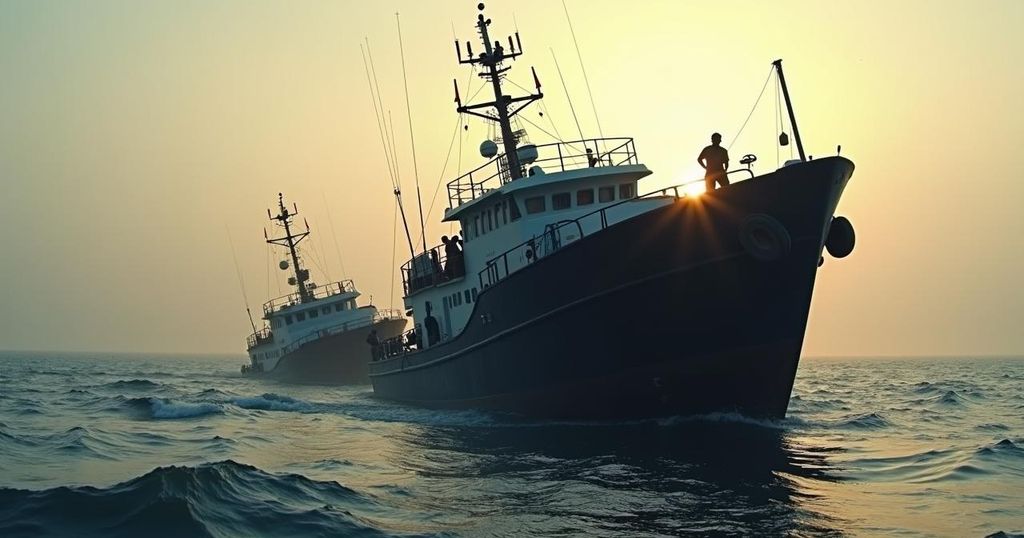In a tragic incident in central Niger State, Nigeria, at least 14 bodies have been retrieved, and around 150 passengers remain missing following the capsizing of an overloaded boat returning from a religious event. Rescue efforts are ongoing, while calls for better enforcement of safety regulations and awareness about water travel are intensified amidst concerns regarding government negligence and rising environmental risks.
Tragedy struck in central Niger State, Nigeria, when a boat carrying approximately 300 passengers capsized late Tuesday night. The boat had been transporting attendees from a religious celebration in the nearby Gbajibo village when it sank, leading to a significant loss of life and many missing individuals. The Nigerian Emergency Management Agency has confirmed that 14 bodies have been retrieved, while approximately 150 passengers are still unaccounted for. Rescue efforts are ongoing along the River Niger, where local divers continue to seek more survivors. Zainab Sulaiman, the emergency coordinator for Niger State, emphasized that the overloading of boats is a recurring issue that has contributed to this disaster. Reports indicate that many of these boats are not only overloaded with passengers but also carry additional freight, which can compromise their stability. “The boat was overloaded, which is what has been happening. They overload the boats, and, you know, most of these boats are old. So, with the weight of people, sometimes they even carry foodstuff in bags, you see that the boat capsizes or breaks into two,” said Ms. Sulaiman. Furthermore, authorities have pointed out that safety regulations regarding river travel, such as capacity limits and the provision of life jackets, are inadequately enforced in Nigeria. Ignorance regarding the use of life jackets is prevalent among rural communities in the area, exacerbating the risks associated with such journeys. An anonymous Niger State official lamented, “As far as I’m concerned, there’s no one using life jackets in Niger State. You know, these are rural areas; they don’t even know what life jackets are all about. So, there’s nobody sensitizing them on the use of life jackets. The state government ought to have procured all these, but there’s none.” In light of these recent events, Ms. Sulaiman called for increased enforcement of regulatory measures: “The regulatory authorities should start to enforce these laws. If they need to send officers there at the boarding point, it will go a long way.” The problem is further compounded by environmental factors, such as rising water levels due to unprecedented rainfall and flooding, which adds a layer of complexity to the issue of water safety. Just last week, the Nigerian hydrological agency issued warnings regarding elevated river levels, signaling potential flooding risks, particularly following water releases from Cameroon’s Lagdo Dam. This incident not only highlights the urgent need for better safety measures but also reflects on the persistent vulnerability of rural communities to such disasters.
In Nigeria, boat accidents have become a tragically common occurrence, primarily due to the neglect of safety regulations on waterways. Poor enforcement of existing laws regarding vessel capacity and the crucial requirement for safety equipment, including life jackets, often leads to devastating outcomes. Moreover, the lack of public awareness and education about water safety in rural areas significantly heightens the risks. This incident highlights systemic shortcomings within the governmental approach to addressing both the immediate safety concerns and the broader issues related to environmental changes impacting Nigeria’s waterways.
The recent boat capsizing in Niger State underscores a grave public safety issue exacerbated by overloading and the lack of regulatory enforcement on water travel. With numerous passengers still missing and escalating calls for stronger oversight, it is imperative for authorities to enhance safety protocols and public education efforts concerning water travel. Furthermore, ongoing environmental challenges, such as increased water levels from climate change, necessitate immediate attention to prevent future tragedies of this nature.
Original Source: www.voanews.com







